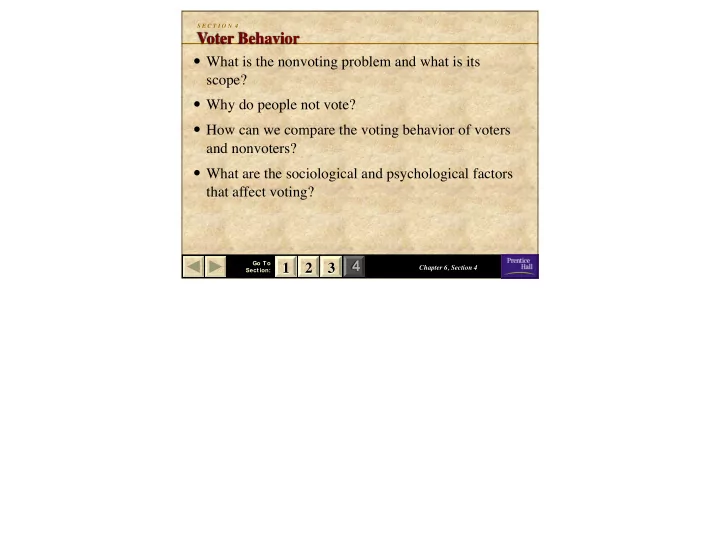

S E C T I O N 4 Voter Behavior • What is the nonvoting problem and what is its scope? • Why do people not vote? • How can we compare the voting behavior of voters and nonvoters? • What are the sociological and psychological factors that affect voting? 1 2 3 4 Go To 1 2 3 Chapter 6, Section 4 Section:
Nonvoters • Millions of Americans do not vote when elections are held. • Only 50.1 percent of eligible voters cast ballots in the 2000 presidential election, and only 46.3 percent of the electorate voted for the members of the House of Representatives. • Voter turnout significantly decreases in off-year elections , congressional elections held in years when there is no presidential election. 1 2 3 4 Go To 1 2 3 Chapter 6, Section 4 Section:
Why People Do Not Vote • Some people cannot vote for various reasons, such as physical or mental illness, unexpected travel, and resident alien citizenship status. • However, most nonvoters do not vote because • voting is in some way inconvenient, • they do not believe that their vote will make a difference, or • they distrust politics and political candidates. 1 2 3 4 Go To 1 2 3 Chapter 6, Section 4 Section:
Voters and Voting Behavior Voting is studied more than any other form of political participation in the United States. We learn about voting behavior from: • The results of elections — information can be gleaned by studying the results of confidential voting compared to the population make-up of a particular sector • The field of survey research — data can be gathered by conducting polls across specific cross sections of the population, as the Gallup Organization does • Studies of political socialization — studying political socialization , the process by which people gain their political attitudes and opinions, can also be useful in predicting voting behavior 1 2 3 4 Go To 1 2 3 Chapter 6, Section 4 Section:
Sociological Factors Voter preferences can’t be predicted by just one sociological factor. Voter opinion is a combination of all of these factors and more. 1 2 3 4 Go To 1 2 3 Chapter 6, Section 4 Section:
Psychological Factors Voters’ perceptions of their party, the candidates, and the issues significantly affects their voting. Candidates and Issues Party Identification • Candidates and issues are two • The loyalty of people to a short-term factors that can particular political party is the influence even the most loyal Democrat or Republican. single most significant and People may vote out of their lasting predictor of how a chosen party if they dislike a candidate or the party’s stand on person will vote. a particular issue. 1 2 3 4 Go To 1 2 3 Chapter 6, Section 4 Section:
Recommend
More recommend